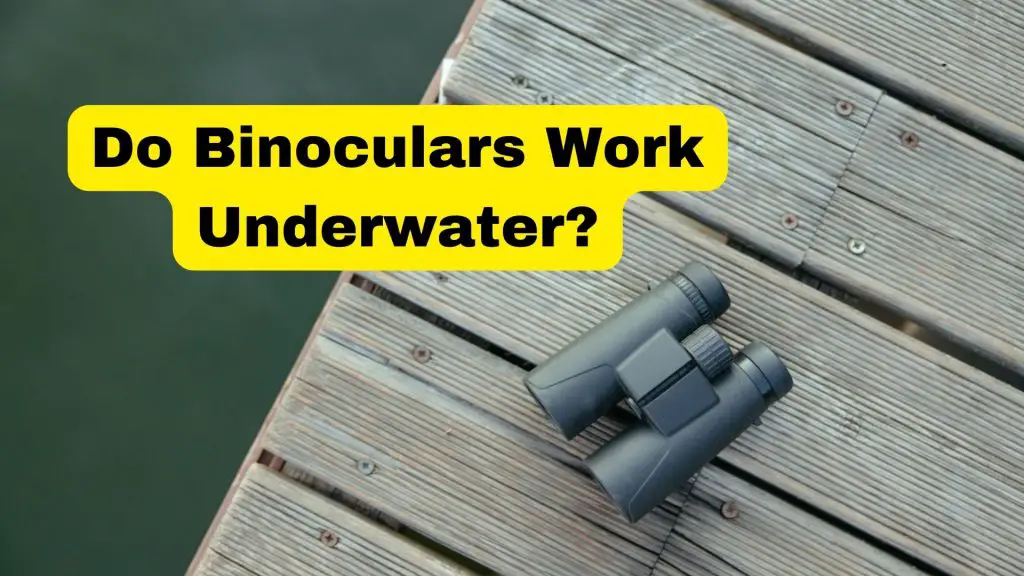Do Binoculars Work Underwater?
If you’ve ever been snorkeling or diving, you know how beautiful and captivating the underwater environment can be.
But have you ever wondered if binoculars could help you get a closer look at the marine life around you? Can they work underwater, or are they limited to above-water use only?
In this article, we’ll answer the question, “Do binoculars work underwater?” and explore the science behind how binoculars and other optical tools function in aquatic environments.
We’ll also delve into the challenges of underwater vision and discuss some of the most popular alternatives to binoculars for underwater viewing.

Binoculars Design & Optical System
Binoculars come in many shapes and sizes, but they all share a common design principle: they use a combination of lenses and prisms to magnify and focus the light that enters the objective lens.
The image is then viewed through the eyepiece lens, which further magnifies the image and presents it to the viewer’s eye.
Binoculars can have different magnification levels and objective lens diameters, which affect their field of view and brightness.
Role of Lenses and Prisms
The lenses in binoculars serve two main purposes: to collect light and to focus the image.
The objective lens is responsible for gathering as much light as possible and forming a sharp image on the prism system.
The eyepiece lens then magnifies and refocuses the image, making it appear closer to the viewer’s eye.
The prisms in binoculars serve to correct the image orientation and reduce the overall size of the instrument.
By reflecting the light path, the prisms also allow for a more compact and portable design.
Underwater optics
When it comes to underwater exploration, whether it be for scientific research, recreational diving or commercial purposes, clear vision is key.
How Light Behaves in Water
Water has a high refractive index of 1.333, significantly higher than that of air, which is only 1.0003. Due to this high refractive index, water has the ability to bend or refract all light rays that enter it.
This means that the direction of the light rays changes as they enter and exit the water, causing distortion and reduced image quality.
Additionally, different colors of light refract at different angles, which causes color distortion and reduced contrast.
As a result, underwater images appear blurred, dim, and colorless compared to above-water scenes.
The Challenges of Underwater Vision
In addition to the physical properties of water, the human eye is also not optimized for underwater vision.
The lens of the eye has a fixed focal length, which makes it difficult to focus on objects at different distances.
Moreover, the amount of light that reaches the retina decreases rapidly with depth, making it harder to see clearly in low-light conditions.
Finally, water absorbs and scatters light, reducing visibility and contrast.
Can binoculars work underwater?
Binoculars are essential tools for many outdoor activities, but can they be used underwater?
The answer is No, Currently, there are no models of binoculars that work underwater.
The Limitations of Binoculars
Binoculars are designed for use in air and rely on lenses and prisms to focus and magnify the image of distant objects.
However, underwater environments present a different set of optical challenges as discussed above that can limit the effectiveness of binoculars.
The refractive properties of water can cause distortion and reduce the clarity and sharpness of the image, making it difficult to focus on specific objects.
Additionally, the reduced amount of light that penetrates the water can make it harder to see objects at a distance.
The Effects of Water on Binoculars
When binoculars are used underwater, they can experience a range of negative effects.
The water can cause the lenses and prisms to become fogged or corroded, reducing the clarity and sharpness of the image.
The seals that keep the water out of the binoculars can also fail, allowing water to enter and damage the internal components.
Finally, the pressure at depth can cause the binoculars to become misaligned or damaged.
Check More: Can Binoculars Get Wet

The Possibility of Underwater Binoculars
Despite these challenges, there are some efforts to develop specialized underwater binoculars that can operate effectively in aquatic environments.
These binoculars may use specially coated lenses and prisms to reduce the effects of refraction and color distortion, and they may have waterproof and pressure-resistant seals to protect the internal components.
However, the development of underwater binoculars is still in its early stages, and there are no commercial models available on the market yet.
Alternatives to Binoculars for Underwater Viewing
While binoculars may not be the ideal tool for underwater viewing, there are several alternatives available that can provide clear and detailed views of the underwater world.
Underwater Cameras
Underwater cameras are one of the most popular alternatives to binoculars for underwater viewing.
These cameras are designed to be waterproof and can capture high-quality images and videos of the underwater environment.
Underwater cameras can be mounted on diving masks, snorkels, or other equipment to provide a first-person view of the underwater world.
Some models can also be controlled remotely, allowing users to capture footage from hard-to-reach places.
Diving Masks with Built-in Lenses
Another popular alternative to binoculars is diving masks with built-in lenses.
These masks have lenses integrated into the design, which can provide a clear and magnified view of the underwater environment.
The lenses are typically made from tempered glass or polycarbonate, which is resistant to scratches and impacts.
Some diving masks also have adjustable magnification settings, allowing users to customize the magnification to suit their needs.
Other Underwater Viewing Equipment
In addition to underwater cameras and diving masks with built-in lenses, there are other types of equipment that can provide clear views of the underwater world.
Snorkels with built-in cameras are becoming increasingly popular, as they allow users to capture footage without having to carry a separate camera.
Underwater lights can also be used to illuminate dark environments and improve visibility.
Finally, underwater drones or remotely operated vehicles (ROVs) can be used to explore and record footage of the ocean floor.
How Underwater Cameras Work-Alternative To Binoculars
Underwater cameras use specialized lenses and sensors that are optimized for the underwater environment. The lenses are designed to correct for the refractive properties of water and to capture as much light as possible.
Additionally, underwater cameras can use special filters to compensate for color distortion and improve contrast.
The sensors in underwater cameras are also designed to be more sensitive to low-light conditions, allowing them to capture clear images even in the depths of the ocean.
Here is an interesting video on The Topic
Conclusion
Binoculars are excellent tools for outdoor activities, but they are not designed for underwater use.
The refractive properties of water can cause distortion and reduce the clarity and sharpness of the image, making it difficult to focus on specific objects.
Additionally, the reduced amount of light that penetrates the water can make it harder to see objects at a distance.
In this article, we have explored the limitations of binoculars and the effects of water on their performance, as well as the possibility of developing specialized underwater binoculars.
As technology continues to advance, we may see the development of specialized underwater binoculars that can operate effectively in aquatic environments.
For now, however, underwater cameras, diving masks with built-in lenses, and other types of equipment offer excellent alternatives to binoculars for exploring the mysteries of the deep.
